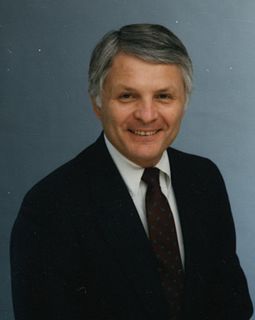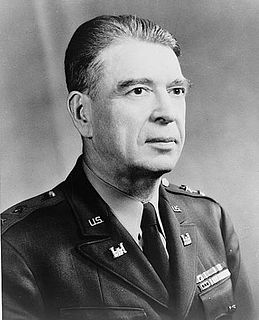
The Executive Office of the President of the United States (EOP) is a group of agencies at the center of the executive branch of the United States federal government. The EOP supports the work of the President. It consists of several offices and agencies, such as the White House Office, National Security Council or Office of Management and Budget.

The Council on Foreign Relations (CFR), founded in 1921, is a United States nonprofit think tank specializing in U.S. foreign policy and international affairs. It is headquartered in New York City, with an additional office in Washington, D.C. Its membership, which numbers 4,900, has included senior politicians, more than a dozen secretaries of state, CIA directors, bankers, lawyers, professors, and senior media figures.

Joseph R. Wright Jr. works in business and used to work in the United States government.

Frank Pace Jr. was the 3rd United States Secretary of the Army and a business executive.
The Commission on Protecting and Reducing Government Secrecy, also called the Moynihan Commission, after its chairman, U.S. Senator Daniel Patrick Moynihan, was a bipartisan statutory commission in the United States. It was created under Title IX of the Foreign Relations Authorization Act for Fiscal Years 1994 and 1995 to conduct "an investigation into all matters in any way related to any legislation, executive order, regulation, practice, or procedure relating to classified information or granting security clearances" and to submit a final report with recommendations. The Commission's investigation of government secrecy was the first authorized by statute since the Wright Commission on Government Security issued its report in 1957.
Rowland Roberts Hughes (1896–1957) was a director of the United States' Office of Management and Budget from April 16, 1954 until April 1, 1956. Hughes, known for his distinctive black eye patch, was called "the logical man" in a 1956 Time Magazine cover story.

The Army Science Board (ASB) provides advice about army science to senior military leaders. The ASB is a Federal Advisory Committee organized under the Federal Advisory Committee Act. It is the United States Department of the Army senior scientific advisory body that was chartered in 1977 to replace the Army Scientific Advisory Panel. The ASB provides the Army with independent advice and recommendations on matters relating to the Army’s scientific, technological, manufacturing, logistics and business management functions, as well as other matters the Secretary of the Army deems important to the Department of the Army. The Secretary of the Army delegates oversight authority to the Deputy Under Secretary of the Army, who appoints the ASB Executive Director. Terms are generally three years.
Bertha Sheppard Adkins was born in Salisbury, Maryland on August 24, 1906 and died on January 14, 1983. She was an educator, political activist, public servant, and a community leader.
Stephen H. Hess is a senior fellow emeritus in the Governance Studies program at the Brookings Institution. He studies media, the U.S. presidency, political dynasties and the U.S. government. He first joined Brookings in 1972 and was distinguished research professor of media and public affairs at the George Washington University (2004–2009). He served on Presidents Dwight D. Eisenhower and Richard Nixon's White House staff and as an adviser to Presidents Gerald R. Ford and Jimmy Carter.
Clarence Francis was a business executive and internationally recognized expert on food.
Jarold A. Kieffer was the first Executive Director of the National Cultural Center, later renamed the John F. Kennedy Center for the Performing Arts.
Arthur Alden Kimball (1908–1996) was a career civil servant who was part of the prosecution staff for the Nuremberg Trials, and also helped establish the Economic Cooperation Administration for administering the Marshall Plan.
The U.S. President's Committee on Information Activities Abroad was created in 1959 by President Dwight D. Eisenhower in order to review the findings and recommendations of the Committee on International Information Activities in its report dated June 30, 1953, and consider changes in the international situation which affect the validity of the findings and recommendations in that report.
The U.S. Council on Foreign Economic Policy (CFEP) was a high-level organization created by President Dwight D. Eisenhower in December 1954 to coordinate the development of the foreign economic policy of the United States.
The U.S. President’s Citizen Advisors on the Mutual Security Program was created by President Dwight D. Eisenhower on September 22, 1956. The purpose of the committee was to study and make recommendations on the role, scope, operation, and impact of military, economic, technical and other foreign assistance programs in relation to the foreign policy and national interest of the United States. It reported to the president on March 1, 1957, and ceased operations by the close of that month.
The U.S. President's Committee on International Information Activities was appointed on January 24, 1953 by President Dwight D. Eisenhower in order to survey and evaluate the government’s information and related policies and activities with particular reference to international relations and the national security. In his announcement on January 26 President Eisenhower said, "It has long been my conviction that a unified and dynamic effort in this field is essential to the security of the United States and of the peoples in the community of free nations."

John Stewart Bragdon, a major general in the United States Army, was born in Pittsburgh, Pennsylvania and earned a B.S. from the United States Military Academy in 1915. In 1919 he graduated from the United States Engineering School and went on to earn a M.S. from the Carnegie Institute of Technology in 1923.
Edward A. Bacon (1897–1968) was born in Milwaukee, Wisconsin and attended the Milton Academy from 1912 to 1916. In 1918, Bacon served in United States Marine Corps and earned an A.B. from Harvard University by 1920.

Frederick Joseph "Fred" Lawton was an American bureaucrat who served as the ninth Director of the Bureau of the Budget. Lawton was born in Washington, D.C., and became a lawyer and an accountant. He spent most of his professional career working with the government bureaucracy. He helped President Franklin D. Roosevelt wager with members of Congress to support the Fair Labor Standards Act. He first joined the Office of Management and Budget as an executive assistant in 1935. He also served as an adviser to Congress. In 1947, he became an administrative assistant to President Harry S. Truman. He was appointed to the post of Director of the Bureau of the Budget in 1950, and held the position until 1953. President Dwight D. Eisenhower appointed Lawton to a term on the United States Civil Service Commission after he left the Bureau; he served from 1953 to 1963.

Elmer Boyd Staats was an American public servant whose career from the late 1930s to the early 1980s was primarily associated with the Bureau of the Budget (BOB) and the GAO. Staats was born to Wesley F. and Maude (Goodall) Staats. Staats received his AB from McPherson College in 1935, his MA from the University of Kansas in 1936, and his Ph.D. from the University of Minnesota in 1939.










